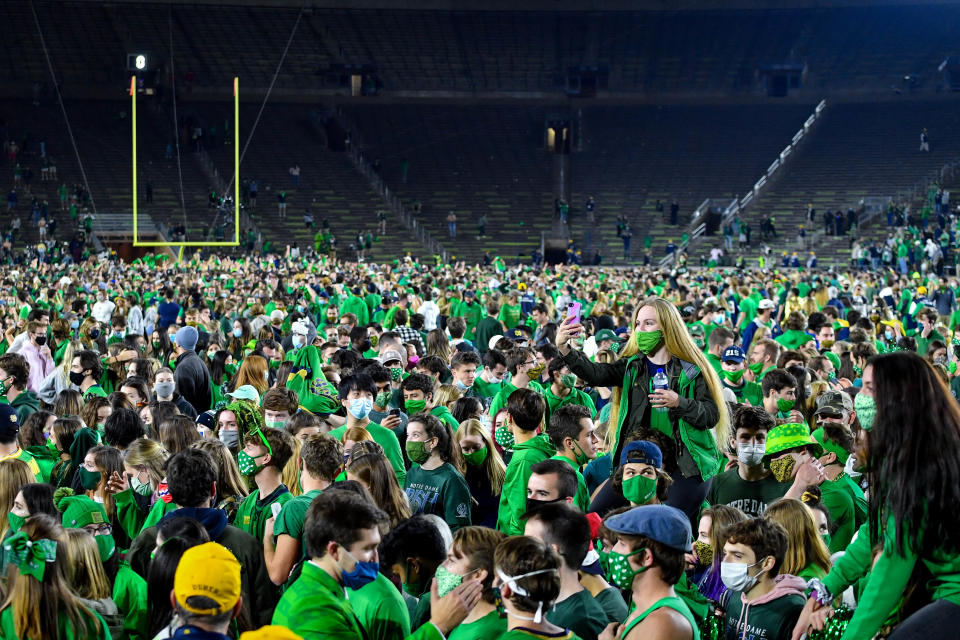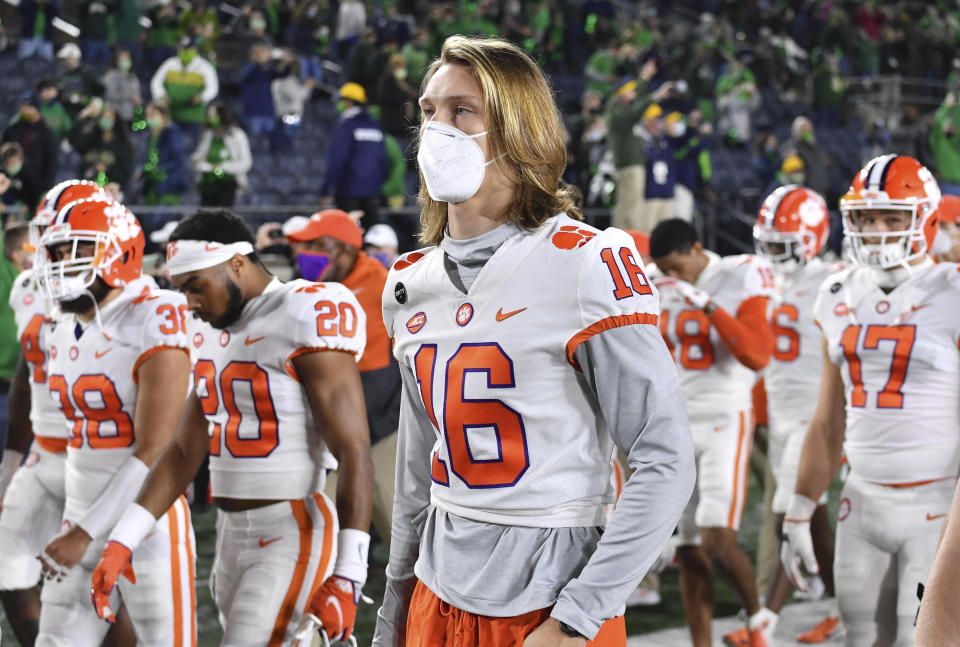College football facing uncertain end to season as COVID cases spike: ‘It’s going to be hard to finish’
The 2020 college football season can be divided into three phases. It began with a fear-and-loathing period, transitioned to a choppy start/restart and is now in a chaotic scramble to the finish. There are 15 games either delayed or canceled this week, and the question the sport’s leaders are asking out loud is a simple one: Can college football slog to the finish and crown a champion?
“It’s going to be hard to finish, to be honest,” a Power Five president told Yahoo Sports on Thursday. “You saw what happened with Maryland and Ohio State [being canceled], and what’s happening in the SEC. The next couple weeks are going to be tricky. The numbers are trending in the wrong direction.”
The signs of the sport’s struggle are obvious. Four SEC games have been postponed this weekend. Overall, double-digit games have disappeared from the schedule for the second consecutive week. The calendar is running out of room to play a full schedule, which means leagues facing the prospect of not fulfilling their already limited inventory quotas for televised games.
The trends in college football, not surprisingly, mirror the COVID-19 trends around the country. There’s been a precipitous spike in COVID-19 positives in recent weeks, and there are few signs that will abate in the short term. On Wednesday, the nation recorded more than 145,000 COVID-19 cases, a single-day record in the United States.
“College football is a great representative of our country at large,” Florida athletic director Scott Stricklin said. “Some weeks, it seems like we’re doing really well with the virus. Some weeks, it’s kicking our rear end.”

Can college football make it to the finish?
The only safe prediction is that it will trudge there. And the sport’s ability to finish will become a test of one of the sport’s longstanding weaknesses — an absence of centralized leadership.
College football leadership, historically, has been about as nimble as a 400-pound fullback. They’ve clung so hard to traditions and ideals — think about how the Rose Bowl parade has impeded progress — that few leaders have ever asked what’s for the best of the entirety of the sport.
The best thing that could happen to the sport is that it finishes — in any way possible. And it does so safely. Could that mean moving the College Football Playoff dates? Could that mean moving the location of whichever empty — or relatively empty — stadium they’d play in? Could it mean creative solutions?
Yahoo Sports spoke to a half-dozen athletic directors on Thursday. And the biggest worry for those in the playoff discussion is how to manage the Christmas holiday. Can you expect 400 players to go home, spend time with families and integrate themselves in their communities and not bring some virus back to campus? Of course not. Returning to campus on Dec. 26 to play the Jan. 1 semifinals appears to be a strategy of hope, not foresight.
There’s already been campus discussion about keeping players on campus for Christmas, which would go as well optically as the day every year when NCAA president Mark Emmert’s salary is released.
The College Football Playoff is more of an uneasy truce from a television contract than an actual entity. Executive director Bill Hancock is better at executing logistics than creativity and vision. It was telling how when Big 12 commissioner Bob Bowlsby said on Sirius XM radio interview that there could be “some latitude to postpone” the playoff games that the Big 12’s Twitter backtracked with a jargon word salad.
It felt like Bowlsby got called into the social media principal’s office for merely suggesting being nimble, which could potentially offend bowl partners, TV partners and host cities. “It’s just good management,” the Big 12 tweet read, regarding discussing different scenarios, “and doesn’t in anyway mean that CFP changes are [imminent].” Translation: Ruler slapped on hand. (And a laugh track ensued around the sport, as the corrective tweet brought more attention than the initial innocuous thought.)
The reality is that it would be foolish for Ohio State and Notre Dame to fly across the country to play in any empty Rose Bowl if they were to meet in the playoff. Why not play in Indianapolis? Why couldn’t Clemson and Alabama do a one-night trip to Atlanta for a College Football Playoff game? But college football has spent so many decades propping up bowls and allowing them to profit off their best product that we shouldn’t just assume common sense would suddenly come into play. Even in a pandemic.

Could bowls, College Football Playoff be pushed back?
The notion of pushing back the season, of course, brings with it a catch-22. Does waiting to play just invite more issues? Are we really certain mid-January is going to look any different with the virus in America than mid-November?
Another factor with bowls and the march to the end of the season for the non-elites will be when the motivation of players starts to dwindle. Will entire teams opt out, rather than fill league television inventory quotas? Those fears exist in league offices.
Tulane team doctor Greg Stewart said we’re in a place in the sport where there’s open talk of “gamesmanship” in how schools are determining the scholarship numbers with contact tracing, opt-outs and injuries. “It’s all going to be very controversial,” said Stewart, who is the chair of the AAC’s COVID advisory group. “There’s gamesmanship with all that stuff. It’s a mess.”
One FBS head coach summed things up this way: “The whole thing is going to hell. I don’t know how we finish.”
We’ve already seen NFL draft-eligible players start skipping off to the pros, like Pitt safety Paris Ford last week. Multiple NFL scouts told Yahoo Sports they expect many more to continue. And some expect mid-season opt-outs to become the new version of skipping a bowl game, something that went from reactionary pearl-clutching to normal in a short period of time.
This is the first week that there’s been open discussion among the sport’s leaders of the pessimism in the season finishing.
“I don’t have any answers,” Stricklin said. “There may be a moment where this doesn’t get to the finish line, but my sense is we’re not there yet. We still have some daylight.”
For college football to exploit that daylight, they need to be flexible. And there are 150 years of evidence and a leadership void that speak to the sport’s challenges with flexibility.
“Where do we go from here?” Ohio State AD Gene Smith said. “Who knows? No one can project. This is a time of uncertainty.”
Uncertainty is the only certainty. And the dueling drama of the games being played and whether the future games will be played will define the season’s waning weeks.
“We’re on one of the downhill side turns on a roller coaster,” Alabama AD Greg Byrne said. “I think it’s going to continue to be a roller coaster ride.”
More from Yahoo Sports:

 Yahoo Finance
Yahoo Finance 